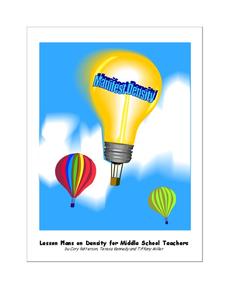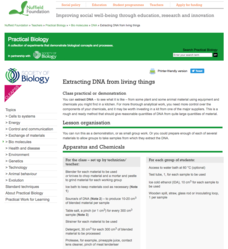Perkins School for the Blind
Conductors of Heat - Hot Spoons
Why is the end of a spoon hot when it's not all the way in the hot water? A great question deserves a great answer, and learners with visual impairments will use their auditory and tactile senses to get that answer. A talking...
Curated OER
Fuel Cell Experimentation
With rising oil prices and increasing concerns over global warming, the pressure is on for engineers to develop alternative sources of energy. Among the new technologies being developed are hydrogen fuel cells, which young scientists...
Facts and Files
The Nile
While it may not be possible to take an entire class to Egypt and explore the ancient wonders, it is possible to engage your young historians in activities that ask them to research these and other antiquities and place them on their...
University of Southern Indiana
Manifest Density
There's a lot content packed into the four lessons of this physical science unit on density. From salad dressing to the water cycle and hot air balloons, these lessons engage students in hands-on activities that explore real-world...
Early Childhood Learning and Knowlege Center
My Body My Senses
In a comprehensive unit of activities, learners explore the five senses. Youngsters discover the many different body parts and their functions that allow humans to have sense of sight, touch, smell, taste, and hearing. The best way to...
NOAA
Importance of Deep-Sea Ecosystems – How Diverse is That?
When judging diversity of an ecosystem, both species evenness and species richness must contribute. After a discussion of diversity and a guided example using the Shannon-Weaver function, scholars use the same function on two other...
Nuffield Foundation
Extracting DNA from Living Things
Help! Someone's trying to take my DNA! An interesting lab experiment has scholars use basic materials to extract DNA. By applying ethanol, cold water, and a protease enzyme, like pineapple juice, they pull strands of DNA from peas,...
Port Jefferson School District
Hurricane Katrina
Young scientists track Hurricane Katrina across the Atlantic Ocean as they learn about these destructive forces of nature. Provided with a table of data tracking the location and conditions of Katrina over a one week span, students...
Curated OER
Mealworms
Crawl into the world of the darkling beetle with this scientific investigation. Watch as the insects move through the larval, pupal, and adult stages of life, recording observations along the way. Discuss the necessities of life as young...
Bethel School District
Observations and Inference
What's the difference between qualitative and quantitative observations? Learners make observations, inferences, and predictions about their environment with a set of questions and activities that are applicable to either language...
Curated OER
Blast Off
In this physical science exploration, small groups place a piece of antacid tablet into a film canister and step back to time how long it takes for the top to pop. They repeat the activity, altering either the amount or temperature of...
Curated OER
Moldy Jell-O
Mini mycologists plan an experiment to determine what affects the growth of mold on gelatin. A list of available materials is provided, but the procedure needs to be designed by the lab group. A data table is also provided in...
Curated OER
Ocean Currents
Learners discover the geography of Earth by analyzing water currents. In this oceanography lesson plan, students create visual references on a map of the globe where and why major ocean currents are moving water. Learners...
Curated OER
It'll Go With the Flow...
Students construct a water table elevation contour map and consider the direction and rate of groundwater flow to predict the actual runoff pattern. They discuss their findings and evaluate a hypothetical landfill site based on data...
Curated OER
Getting to Know You
Students participate in tactile and visual exploration. In this tactile and visual exploration lesson, students listen to John Archambault's, Grandmother's Garden, and sing the song, "Friends Are Like Flowers." They participate in ice...
Curated OER
What's the Difference Between Concentration and Solubility?
Students discuss the difference between concentration and solubility as well as examine the difference in a hands-on activity. Using water and table salt, they experiment with solubility. They create different concentrations using water...
Curated OER
Oil + Water + Wildlife = A Real Mess
Middle schoolers conduct an experiment. In this environmental protection lesson, students explore how oil spills affect living organisms in an ecosystem. Middle schoolers work in groups to complete a lab activity and then discuss their...
South Gloucestershire Council
Animal Classification: A Collaborative Sorting Activity for Key Stages 2 & 3
Introduce the logic behind a dichotomous key or administer a group performance assessment with a fun and challenging classification lesson. With explicit instructions for the teacher and for collaborative groups, as well as engaging...
G. Turrell
Science Activity 1: Light & Sound
Are you looking for lab sheets to go with your class experiment on plant response to light? You are no longer in the dark! This is a lesson that was written for a unit on light, but could easily be used to demonstrate plant behaviors in...
EngageNY
Inferring about Character: Analyzing and Discussing Points of View (Chapter 2)
Welcome to the World Café! Readers discuss A Long Walk to Water by Linda Sue Park. They circulate throughout the classroom, stopping at different tables to answer a discussion prompt with their classmates and record their ideas on a chart.
Bonneville
Creating the Most Effective Solar Heater
If changing one variable can improve a design, why not try changing more? Using the results from the previous activity, scholars decide on the variables that caused the most improvement in the effectiveness of the solar heater. They take...
Curated OER
Sand and Water
Students follow this recipe for fun clay creations. In this early childhood art and science lesson, students develop creative-thinking skills, fine-motor skills, and sensory awareness while they make, mold, and decorate salt dough.
Curated OER
Drip, Drip, Drip or The Case of the Leaky Faucet
Learners explore the cost of wasted water. In this math lesson, students conduct an experiment in which they collect data on how much water is lost when a faucet leaks. Learners figure the cost of the water that was wasted.
Curated OER
Go Jump In The Lake!
Learners experiment with local lake water to determine the health of the lake waters. They explore the human impact on the lake water, hypothesize and share inferences in a scientific report.























